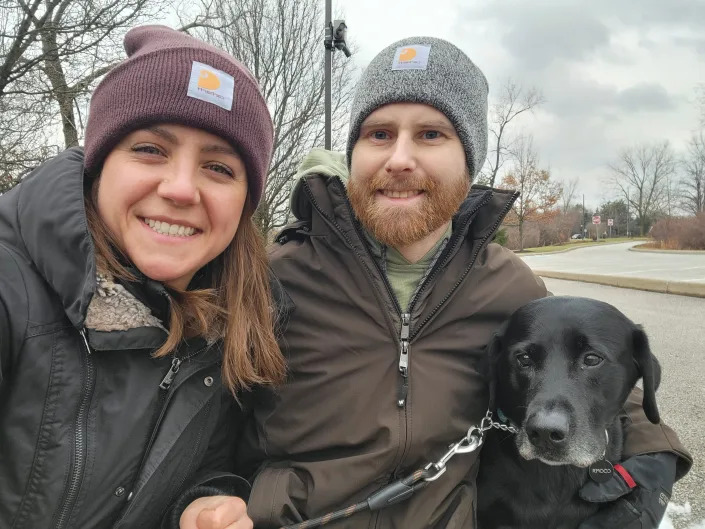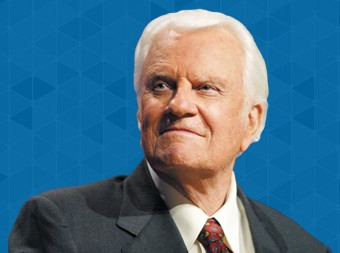Man with rare cancer given 6 months to live saved by first-of-its-kind transplant
Posted by Temmy
Tue, July 05, 2022 5:01pm

Andy and Rachel Voge (Courtesy Andy and Rachel Voge)
A man suffering from a rare type of cancer called pseudomyxoma peritonei (PMP) which can surround the organs in the abdomen has survived thanks to a groundbreaking multi-organ transplant procedure.
Andy Voge, 33, thought he had six months to live before he met a doctor from the U.K. who successfully removed and replaced all of his affected organs in a first-of-its kind operation in the U.S.
It all began in January 2019, when Voge and his wife, Rachel, living in Minnesota at the time, noticed a bulge on Voge's abdomen. "I didn't really think anything of it. She called it my funny looking belly button," Andy Voge told NBC News' Kate Snow in a segment aired on TODAY Monday.
He went to his primary care physician to have it checked out just in case. "He said, it's just an umbilical hernia, we don't need to do anything about it," Voge recalled said. But routine blood work revealed his liver enzymes levels were off.
"So we did an ultrasound the next day, and they found masses in my liver," Voge said. A CT scan the following day would reveal he had cancer of his appendix. Only a few days after going to the doctor for his "funny-looking belly button," he was diagnosed with a rare form of appendix cancer, pseudomyxoma peritonei, or PMP.
It was a complete shock for the couple. "A couple of days before I'd gone for a run, we were eating fine. Everything was normal," Voge said.
PMP, also known as jelly belly, typically starts with a slow-growing tumor in the appendix that bursts and starts squeezing out mucus, Dr. Anil Vaidya, a surgeon at Cleveland Clinic and the Voges' doctor, told Snow.
This causes a buildup of mucus-secreting tumor cells, which slowly fill the abdominal cavity. "There is no control on the amount of mucus that secretes. It layers and causes compression of the organs inside the abdomen," Vaidya explained. The expansive jelly-like substance can eventually harden like cement and wrap around or strangle the rest of the organs. It can squeeze the intestines, bile ducts, or blood vessels to a point where "patients are obstructed so they can't eat or drink," Vaidya explained.
Because this type of cancer is so slow-growing, it often goes undetected for a long time. Common symptoms include abdominal pain and swelling, but patients may be asymptomatic for years. PMP is commonly missed or misdiagnosed because it is so rare — two to four cases per one million people, according to Vaidya.
Voge said while it was overwhelming and upsetting to get diagnosed with PMP, he felt very lucky that he got a diagnosis in four days. A week later, he went to the Mayo Clinic near his home for treatment and learned his cancer would not respond to typical chemotherapy.
PMP is usually treated through a combination of surgery to remove as much of the tumor and mucus as possible (a process called "de-bulking") and heated chemotherapy, Vaidya explained. De-bulking doesn't cure PMP, but removing the malignant jelly and hardened mucus can relieve pressure on other organs.
"My first surgery, he took out right away about three liters of mucin," Voge said. The surgery also removed his gallbladder, spleen, appendix and omentum, which hangs down from the stomach. Although his doctors said there was still some tumor left around his liver and stomach, Voge's surgery otherwise went well, and he was back to his normal routine in six weeks. "The path after this surgery is monitoring. They put you on a watch-and-wait routine," he said.
The summer after Voge's first surgery, the outdoors-loving couple bought a trailer and traveled around state parks in Minnesota. At his six-month follow-up in August of 2019, everything looked fine. "There was no indication of new tumor growth. We felt really good leaving," Voge said. By the fall, the couple decided they wanted to travel full-time, so they sold their house in Minnesota. "Then all of a sudden, everything kind of fell apart again."
At a follow-up appointment in February 2020, Voge's doctors told him the tumor was growing again and the majority of what they had removed had grown back. "We knew that it was going to come back. We knew that we were going to have to deal with it again. It just happened so much faster than we assumed," Voge recalled.
That appointment was a major turning point for the couple.
"We're like, we have limited time. Let's take advantage of it," Rachel Voge told Snow. They bought a new fifth-wheel R-V the next weekend and were on the road by March. They spent the next few months exploring national and state parks around the United States, documenting the journey on social media. During this time, the COVID-19 pandemic had also begun.
But Voge's health started declining rapidly. "I was vomiting daily. I couldn't keep water down. I was pretty malnourished and dehydrated," he said. The symptoms were likely due to intestinal blockages from the cancer, he later learned. They high-tailed it back to Minnesota and went to the emergency room at the Mayo Clinic.
At the ER, Voge expected to get another surgery like his first one to remove as much of the tumor and mucus as possible and relieve his symptoms. "We were under the impression that we'd go in, we'd do another surgery, clean it out and have some more normal lifetime," he said.
Instead, Voge got "devastating" news, as he describe it. Another surgery to remove his cancer was impossible. Three days later, Voge was put on a feeding tube. The couple began looking into different treatment options and clinical trials. "That whole fall was just constant trips to the ER," he said. At the end of January 2021, Andy was hospitalized due to a hole in his bowel.
"They wanted to go in and operate, but they just couldn't get to the bowel," he said. "That's when my doctor told me I had about a 50-50 shot of making it through that night."
Voge spent the next few hours calling friends and family to say goodbye. Because of the pandemic, he could only have a limited number of visitors. That night, his wife was allowed to sleep on a cot next to him. "I thought it was done," she said.
Voge ended up surviving the night, but the road ahead looked grim. "They probably figured I had about six months left," he said. Voge was sent home on antibiotics and nutrition administered through an IV, and the couple began looking into hospice facilities. "We tried to enjoy what we could," he added.
A few weeks later, Voge got a phone call that changed everything. Vaidya had recently moved from the U.K. to the Cleveland Clinic and happened to reach out to Voge's doctor at the Mayo Clinic. Vaidya had helped a handful of U.K. patients PMP by performing a multiorgan transplant. But it had never been done in the US.
"When I came to the Cleveland Clinic, I was trying to say ... there is another option if patients have failed conventional therapy. I have a solution," Vaidya told TODAY.
A multiorgan transplant involves removing all of the diseased abdominal organs, such as the intestines, stomach, pancreas and liver, and replacing them with healthy organs at the same time. This kind of transplant has been performed since the 1980s, but for treating PMP, it's new, Vaidya said.
"I need to reiterate that this transplantation is reserved for patients who fail (the de-bulking surgery and heated chemotherapy)," Vaidya said. "That conventional procedure is quite successful, (as) 85% of patients will do well after that and have no recurrences or small recurrences that can be taken out," Vaidya said "That fails in a very small percentage of people."
"It's a very major procedure. The whole concept is pretty daunting," Voge recalled. After taking a few days to mull it over, the couple decided they wanted to keep fighting and that this was their last hope. "Pretty quickly, we said we have don't have anything to lose," said Voge.
As soon as he was told he was approved for the multiorgan transplant, the couple packed up and moved to Cleveland. Voge got on the organ transplant list in late July 2020. After that, it was a waiting game for a donor. "By this point, my biggest fear had shifted from the surgery itself to not being able to get organs fast enough," Vogue said.
While his medical teams worked to identify an organ donor who was a match, Voge's condition deteriorated.
"You could tell that things were declining. I got jaundice, my liver was shutting down," he said. While in the hospital to get his liver drained, Voge got the call that they found a match. One individual would donate all seven organs to save his life.
The surgery lasted 17 hours. After removing Voge's liver, stomach, pancreas and intestines, Vaidya cleared out as much of the tumor as he could from Voge's abdominal cavity and transplanted the healthy donor organs.
"It was a big team effort," said Vaidya. It was the first time doctors have done a multiorgan transplant to treat this type of cancer in the United States.
Voge remained in the hospital for six more weeks. Other than a few routine procedures to flush out excess fluid in his abdomen and a bout of pneumonia, his recovery went well. He credits his wife for helping him get through everything. "Rachel has been my rock," he said.
Voge's first transplant evaluation was just over a year ago. Today, he's able to eat again and even went for a 30-mile bike recently.
"The unfortunate part with appendix cancer is it does have a really high recurrence rate, so the future is still pretty uncertain. But it's definitely a lot better than it was," Voge said, adding "Dr. Vaidya is very hopeful about the long term outcome."
According to Vaidya, the chances that he will still have these organs in 10 years are about 70%.
A multiorgan transplant will not be the answer for all abdominal cancers. But for patients with slow-growing tumors like PMP who have not responded to conventional treatments, this surgery has a good track record.
"It's quite early right now. We need more patients and data," said Vaidya.
In the meantime, Voge's story can give patients and doctors hope about what is possible. "There's always hope in different pockets of our lives. And never give up that hope," Vaidya said.
Voge wants other appendix cancer patients to know that this is an option now, and to stay hopeful about new treatments.
"Even in those darkest moments there was always something to fight for," Andy said.

Andy at the hospital (Courtesy Andy and Rachel Voge)
|








